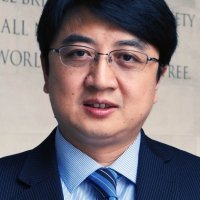Does China Have a Foreign Policy?
China is rising as a global power, but the position that top foreign policy officials occupy in the Chinese political system is surprisingly far from the center of power, writes Zheng Wang in this op-ed.
China is rising as a global power, but the position that top foreign policy officials occupy in the Chinese political system is surprisingly far from the center of power, writes Zheng Wang in this op-ed.

While many Western analysts focus on the balance of reformers and conservatives in China’s new leadership, most overlook the absence of career diplomats and foreign affairs experts at the highest level of power in Beijing.
China is rising as a global power, but the position that foreign policy occupies in the Chinese political system is very low.
On Saturday, the government, led by the new Chinese president, Xi Jinping, announced its new foreign policy team.
Yang Jiechi, the foreign minister since 2007, was elevated to the State Council. His successor, Wang Yi, has overseen relations with Taiwan and Japan and represented China in talks with the West over North Korea’s nuclear program. China also named a new ambassador to the United States: Cui Tiankai, a career diplomat and a graduate of the School of Advanced International Studies at Johns Hopkins University.
However, neither Mr. Yang, who will continue to oversee foreign relations, nor Mr. Wang, the new foreign minister, is among the 25 members of the Politburo — the power center of Chinese politics.
None of the seven members of the even more powerful Politburo Standing Committee — which includes Mr. Xi and the new prime minister, Li Keqiang — is a foreign policy expert, though one of them, Wang Qishan, has worked closely with the last two Treasury secretaries of the United States, Henry M. Paulson Jr. and Timothy F. Geithner, in coordinating the response to the global economic crisis of 2007-8.
China watchers have a tendency to overstate the sophistication of Beijing’s foreign policy and ambitions, but the truth is that China’s foreign policy is highly deficient. While the outsiders often see China as a rising giant and a threat, Chinese leaders are in fact largely nervous and insecure, uncertain of how to manage, both at home and abroad, the inevitable tensions that arise from their nation’s rapid ascent on the world stage. For the newly “elected” leaders, their first challenge would be how to fill the foreign policy vacuum and how to solve the country’s choice between nationalism and globalism.
Words like “aggressive,” “assertive” and “arrogant” have been used to describe China’s foreign policy, particularly with respect to its protracted war of words with Japan over a set of disputed islands in the East China Sea.
However, a country’s foreign policy should be judged on the basis of its actions as well as its rhetoric. When we conduct a careful examination of Chinese policies and actions, we see that Chinese foreign policy is actually ambivalent, even weak. Beijing does not have a clear and well-developed policy on many issues, from the disputed islands to North Korea to climate change. Strong rhetoric is often used to compensate for weak or incoherent policies.
In fact, China’s bark is often far worse than its bite: China has not been at war with another country since a brief armed conflict with Vietnam in 1979, and has been very cautious in its dealings with its neighbors who occupy islands claimed by China in the South China Sea. This explains why Chinese nationalists have at times criticized the government’s foreign policy for being as soft and accommodating.
The absence of clear policy also partly explains why China lacks decisive influence even over strategic allies who depend most on its support, like North Korea, Myanmar and Pakistan. North Korea’s recent nuclear test and decision to nullify the 1953 armistice that ended the Korean War is but the latest example. If a country does not have a clear foreign policy, it will not know when, where and how to use its power. It cannot provide a road map for its allies to follow.
Behind this foreign policy vacuum is a dual crisis of identity. First, Beijing is not prepared to take on the bigger role that other countries expect it to play. Hu Jintao, Mr. Xi’s predecessor as president, was the first Chinese leader who had to run a China that had truly become a full member of the international system. Beijing still needs time to adjust to its new status as a world power and absorb the radical economic, social and cultural transformation it has experienced in recent decades.
Second, the Chinese political elite is facing a major conflict between domestic politics and foreign policy. On the one hand, the leadership strategically allows nationalism to flare, now and again, to serve the regime’s domestic needs to increase its legitimacy and internal cohesion. On the other hand, the often crudely jingoistic nationalism makes it more and more difficult to be cooperative and professional in China’s diplomatic dealings.
Since the early 1990s, as a nominally socialist regime shifted to free-market authoritarianism, the Chinese Communist Party has turned to nationalism as a playing card to maintain its control. This propaganda has included a “patriotic education” campaign focused on China’s humiliating modern history with the West — a curriculum that, of course, portrays the party as the solution to a weak, divided China.
At the same time, China has actually bravely embraced globalization. Even before joining the World Trade Organization, in 2001, it was arguably the greatest beneficiary of globalization. Its giant trade surpluses and enormous reserves of foreign currency — especially American dollars — have provided the government with huge resources for multiple tasks, from a large stimulus program following the global financial crisis to the suppression of domestic unrest.
The new Chinese leadership will be tempted to please its domestic base by adopting more nationalistic foreign policies. China has many domestic troubles, from corruption to a slowing economy. However, the new leaders have to make sure that they fully understand the consequences of China’s heading down a path of nationalism.
China is highly dependent on the global market, resources, investment and technology. A more nationalistic, hard-line route would inevitably cause more conflict and direct confrontation with China’s neighbors, even to the point of war. Such an outcome would severely set back China’s desire to assume a role it believes should be commensurate with its wealth and size.
The challenge is for China’s diplomats, who are not represented at the highest echelons of power in Beijing, to make clear to the government how shortsighted and unwise a confrontational foreign policy strategy would be. I hope this is the first foreign policy advice that President Xi gets from his advisers.
This op-ed first appeared in The New York Times.


The Kissinger Institute works to ensure that China policy serves American long-term interests and is founded in understanding of historical and cultural factors in bilateral relations and in accurate assessment of the aspirations of China’s government and people. Read more


The Indo-Pacific Program promotes policy debate and intellectual discussions on US interests in the Asia-Pacific as well as political, economic, security, and social issues relating to the world’s most populous and economically dynamic region. Read more



